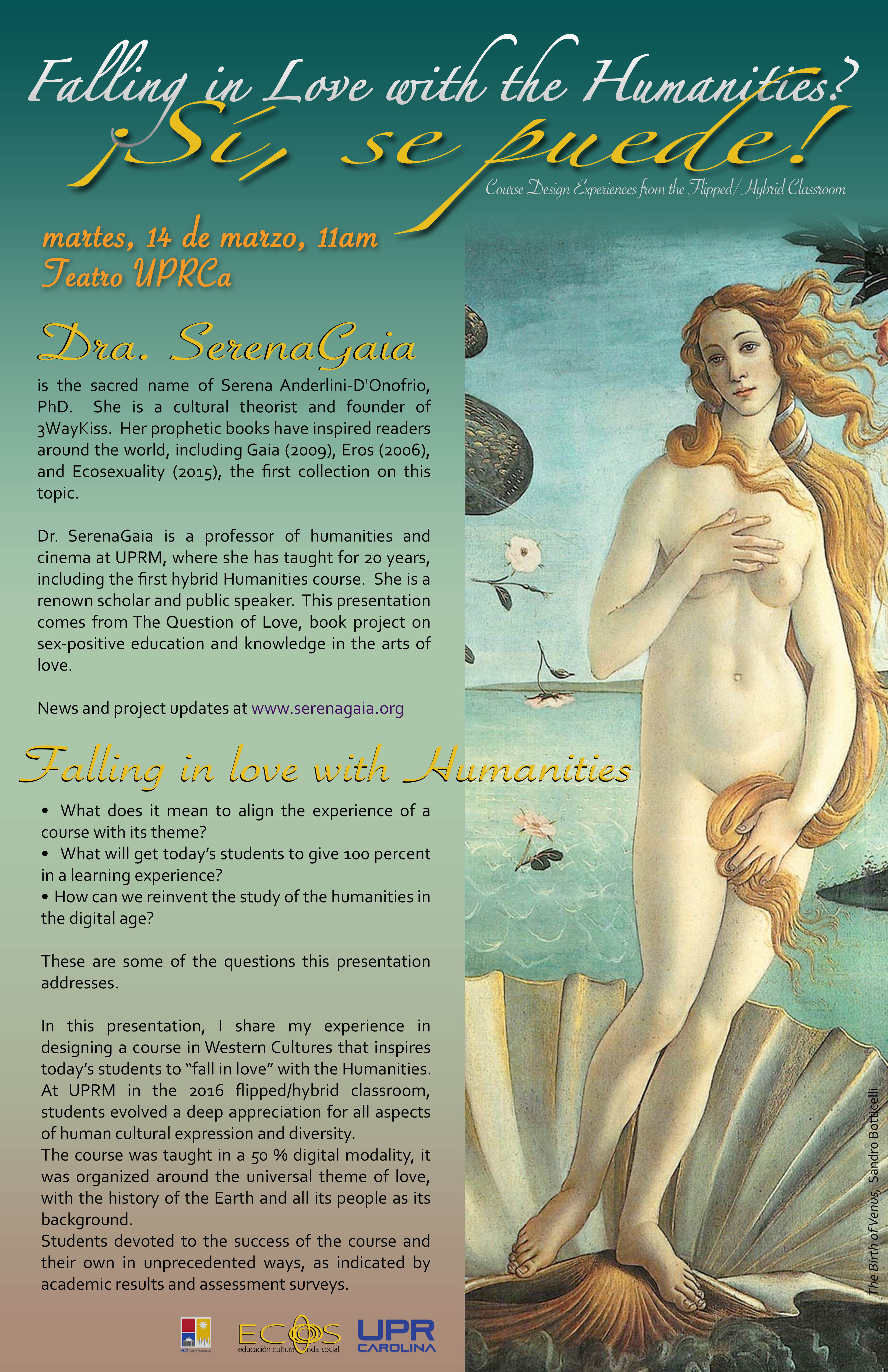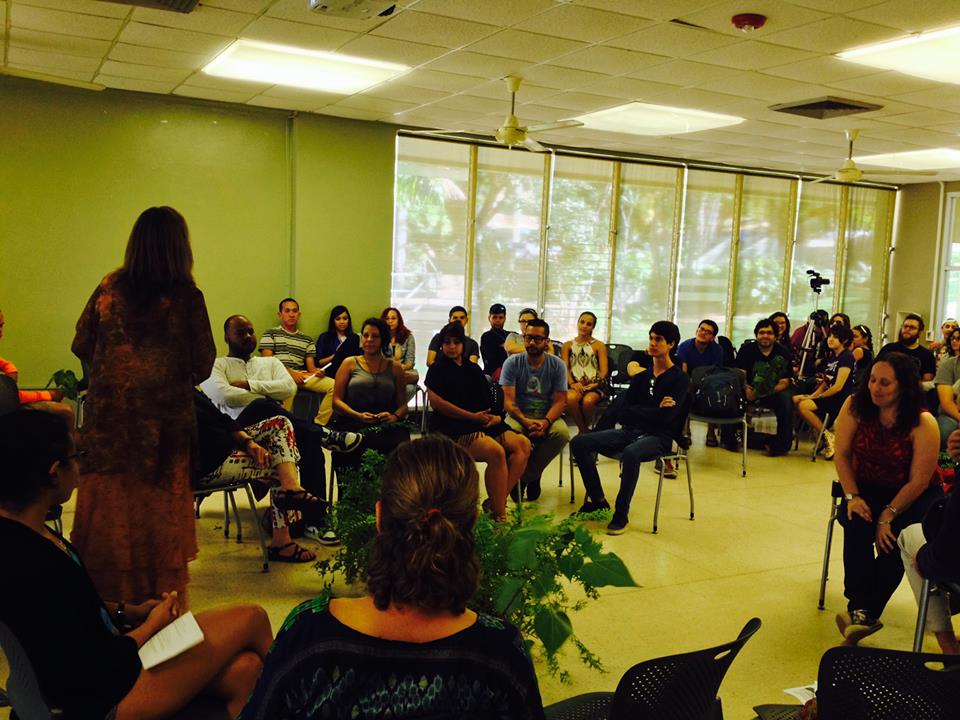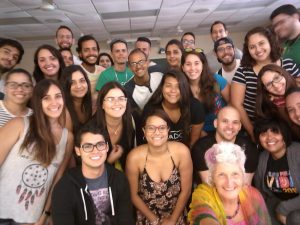While teaching a two-semester basic course in the Humanities in the past 10 + years, I’ve evolved a narrative about history that focuses on the Earth and all its people, and a series of readings that deploy the diverse and imaginative ways that humans have practiced the arts of love across time and space.
I feel the multiple crises we face today require that this course go digital. That way everyone can take it from all over the planet. I believe that would be a great gift. It would empower people to make love the ecology of their lives in ways they feel inspired to.
Crises result in successful reinventions when there is openness, trust, collaboration.
These are difficult to generate in times of crisis, and yet that’s when they are really necessary!
 A very wide support is necessary to evolve.
A very wide support is necessary to evolve.
In this context, I am happy to accept the invitation from UPR Carolina, a small campus in the UPR system, to present my project on March 14. We start at 11 am in the Teatro:
“Falling in Love with the Humanities? Si, Se Puede! Course Design Experiences from the Flipped/Hybrid Classroom.”
Don’t you love the beautiful poster they’ve prepared for me? It’s really neat and I’m excited about the whole thing.
I believe that the humanities are the sciences that help us understand the belief systems we have. The arts are the sciences that help us invent the belief systems we need.
And I believe that teaching the Humanities from the Point of View of Love and in a way that students love can get students to fall in love with the humanities,  appreciate their significance, and become lifetime learners that will require these courses in their curricula.
appreciate their significance, and become lifetime learners that will require these courses in their curricula.
In a crisis, reinventions are a path to the future.
Reinventions may be a challenge for large institutions because much agility is needed.
In a smaller context, activating the imagination together may be easier.
When we interpret the Arts and Humanities as sciences that help us understand the present and invent the future we need, we would not  remotely consider doing away with them.
remotely consider doing away with them.
And yet, when a university is threatened with losing about one third of its total budget from one year to the next, one has to activate the imagination very quickly for a prayer to save these significant learning tools.
That’s what my proposal does. The millennial generation loves to learn online. It’s starved for knowledge they can use to invent the future they need. What we can give them is a structure that will empower them to learn digitally about these things. That’s what my course does.
The ways that love has been practiced across time and space are so diverse. They’re so imaginative. Learning about them is a way to learn about the beauty and diversity of our species.  And thus acquire the tools to co-design the amorous lives one wishes.
And thus acquire the tools to co-design the amorous lives one wishes.
This is the reinvention I propose for a basic, two-semester course that’s part of most university curricula in the US and territories.
It has worked well at UPRM.
I’ve produced the Lectures for the period 1500-2000.
I’ve embedded all tests and learning modules in the Canvas LMS system.
 I’ve taught the hybrid/flipped form for one semester, Fall 2016.
I’ve taught the hybrid/flipped form for one semester, Fall 2016.
I’ve measured the results in a Survey and an Encuesta.
Students have given evidence of their love for the course with direct action as course protectors. When we had a chance to run the course as hybrid/flipped, we created together this inspiring video.
The project is seeking an open heart space, a campus, ecoversity, or other kind of hospitable institution, eager to see it evolve into the next stage. This could include producing the Lectures for the period Neolithic to 1500, upgrading the first semester to hybrid/flipped, and upgrading both semesters to MOOC, or massive online open-enrollment course.
Access the pdf print of the presentation “Falling in Love with the Humanities? Si, Se Puede! ” at this link. Enjoy! Imagine the project done.
An investment in this project can accomplish many things at once:
- Take a basic course for a walk out of the presential classroom.
- Optimize this course so it can be featured in the world-wide digital sphere.
- Get millennial students to fall in love with the humanities and become lifetime learners.
- Get the university that sponsors this project on the map of those institutions that care about the public and offer basic courses for free.
- Offer potential students from all over the world a taste of this institution and attract them to study at the school and become part of the region.
These all seem very desirable things to me. They can save money too, while keeping quality and even improving it. I am investing my energies in these possibilities.
Send good energies and wish the project good luck!
Thank you!
aka Serena Anderlini-D’Onofrio, PhD
Convenor of Practices of Ecosexuality: A Symposium
Website Serenagaia.org
Project: “Amorous Visions: Ecosexual Perspectives on Italian Cinema”






